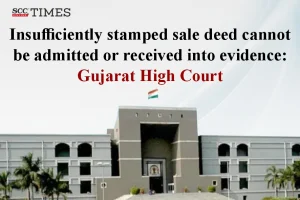Gujarat High Court: In an application for issuance of the writ of mandamus/certiorari to quash or set aside the order of the trial court rejecting the appellant’s application to exhibit the sale deed entered between Defendant 1 and Defendants 4-9 (‘respondents’), a Single Judge Bench of Maulik J Shelat*, J, opined that an insufficiently stamped sale deed could not be admitted into evidence or exhibited as part of evidence.
Background
The trial court had accepted her application under Order 11 Rule 12 of the Civil Procedure Code, 1908 (CPC), requesting the trial court to direct the respondents to submit the original sale deed. However, the respondents had submitted that due to insufficiency of stamp duty, the sale deed had not been released by the Registrar concerned and was therefore not in the possession/custody of the respondents.
The trial court had rejected the appellant’s application to give exhibit to the aforementioned sale deed and that order of the trial court had been challenged by the appellant.
The Court dealt with two questions:
- Whether the sale deed could be exhibited, and;
-
Whether the trial court had committed a gross error of law or a jurisdictional error by rejecting the appellant’s application.
Analysis, Law and Decision
The Court observed that the appellant had challenged the sale deed since the inception of the suit, however, neither did she ever called upon the defendants to produce the original copy of the same deed, nor did she raise any questions about the non-exhibiting of the sale deed between 2014 to 2019. Instead, she had filed an application with a request to give an exhibit to photocopy of the sale deed.
The Court referred to Section 34 of the Gujarat Stamp Act, 1958 which stated that any instrument that is required by law to be stamped shall be inadmissible in evidence unless it is duly stamped. The Court relied on Vijay v. Union of India, (2023) 17 SCC 455 and stated that when an instrument was not duly stamped, it could not be received or admitted in evidence, for any purpose, by any person, irrespective of any consent of parties’ authority to receive evidence. Therefore, once it was admitted in Court that the sale deed was insufficiently stamped, by no stretch of imagination could it be received to admit in evidence, especially when the appellant had challenged the said sale deed.
The Court noted that while it’s true that the rule of procedure is a handmaid of justice and a hyper technical approach should be avoided, it cannot be bent to such an extent that every legal requirement or evidence can be brought on record irrespective of its inadmissibility. Rules of evidence must be considered vis-à-vis provisions of CPC. Furthermore, the Court observed that technicality should not override a justice-oriented approach, but that approach cannot be arbitrary, fanciful and contrary to mandatory provisions of law.
Thereafter, with respect to the first issue, the Court held that the sale deed could not be exhibited.
With regard to the second issue, the Court held that no gross error of law or any jurisdictional error had been committed by the trial court in rejecting the appellant’s application. Thereafter, finding no merit in the application, the Court did not deem fit to exercise its power under Article 227 of the Constitution and declined to interfere with the order passed by the trial court.
[Savitaben Bachubhai Trivedi v. Trivedi Romaben, 2025 SCC OnLine Guj 2384, decided on 23-6-2025]
Order by: Justice Maulik J Shelat
Advocates who appeared in this case :
For the Appellant: Shegun B Chokshi, SP Majmudar, Advocates


